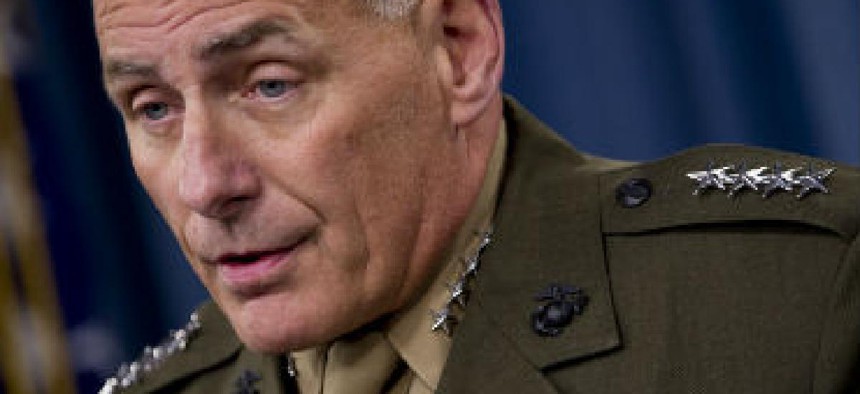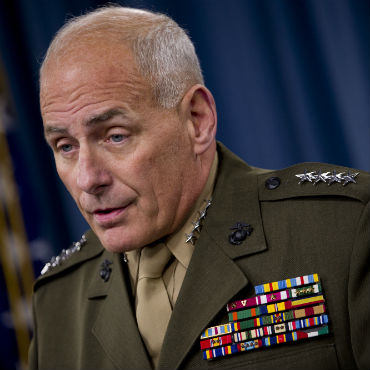Gen. John Kelly picked to head DHS under Trump

The president-elect has selected another retired Marine general for his cabinet -- John F. Kelly to head the Department of Homeland Security.

Lt. General John F. Kelly (ret.) is President-elect Donald Trump's choice to lead DHS.
President-elect Donald Trump is picking another retired Marine general for his cabinet. John F. Kelly is Trump's pick to lead the Department of Homeland Security, according to multiple media reports.
The appointment puts two top generals in Trump's inner circle, assuming both are confirmed The president-elect recently tapped Jim Mattis to lead the Defense Department -- a nomination that will require Congress to waive a statutory requirement that Defense secretaries be at least seven years removed from active duty. Kelly served under Mattis in Iraq.
A blunt-spoken Boston native, Kelly has been in the mix to lead a cabinet department since the election, despite not endorsing Trump during the campaign. The 66-year-old retired general once headed the Southern Command, which includes military efforts to partner with South American and Caribbean nations to stop the cross-border flows of drugs, weapons and other illicit traffic.
Border security, immigration and customs are among the top priorities at DHS, and curbing illegal immigration and strengthening border enforcement by building a wall along the U.S.-Mexico frontier were among Trump's most prominent campaign pledges.
In addition to immigration and border security, DHS is the lead civilian agency in charge of cybersecurity for federal networks and for critical infrastructure. The agency employs more than 240,000 workers and has a discretionary annual budget of more than $40 billion.
Juliette Kayyem, a former assistant secretary at DHS, said the selection of Kelly will come as a relief to officials inside and outside of the agency given some of the other candidates being considered.
"The challenge for Kelly is going to be that DHS is a civilian agency and a vast majority of their work is integrating state and local capacities," Kayyem said. "That's a different job than traditional 'chain of command,' but because Kelly comes from SOUTHCOM, which is primarily a diplomatic post, he knows how to do politics."
She said Kelly will quickly learn how diverse and complicated the DHS portfolio is, but that his background in disaster management will be an asset in the position.
As the head of SOUTHCOM, Kelly had to focus on threats to America along its southern border and the drivers of criminal activity and trafficking across that border. Kelly addressed the topic in his SOUTHCOM posture statement delivered to the Senate Armed Services Committee in March 2015.
"In my opinion, the relative ease with which human smugglers moved tens of thousands of people to our nation’s doorstep also serves as another warning sign: these smuggling routes are a potential vulnerability to our homeland," he stated, adding that terrorist organizations could exploit drug and human trafficking networks to threaten the nation. Kelly also criticized U.S. efforts to combat transnational organized crime emanating from South and Central America.
However, Kelly also stressed the importance of partnering with DHS and other agencies to promote the forward defense of the U.S. homeland.
"Secretary Jeh Johnson and the heroic men and women at DHS deserve enormous recognition working cooperatively across the interagency to help us safeguard our nation’s southern approaches," Kelly said. "Secretary Johnson and I both share the conviction that homeland defense does not begin at the 'one yard line' of our Southwest border, but instead extends forward, throughout the hemisphere, to keep threats far from our nation’s shores."
Kelly's public record on technology issues is thin. In questions for the record submitted after his 2012 confirmation hearing to lead SOUTHCOM, he spoke to the importance of persistent intelligence, surveillance, and reconnaissance capabilities in cross-agency and international efforts to detect illicit trafficking.
"New platform and sensor technologies will need to be integrated into a holistic theater ISR architecture that incorporates and leverages partner nation and U.S. interagency capabilities, and will require inherent automated re-tasking, exploitation, fusion and reporting capabilities," Kelly wrote in response to a question from the Senate Armed Services Committee.
Kelly also has publicly fretted about the possibility of a high-profile government job after his retirement. Reflecting on a 45-year career in the military, Kelly told Defense One in January 2016, "My fear was of being offered a job that would be kind of a full-time position at a veterans' organization or even in the government… I'd prefer to not be that, to come up the Beltway every day."
Some in Congress were quick to weigh in. Rep. Bennie Thompson (D-Miss.), the ranking member of the House Homeland Security Committee, issued the following statement: "General Kelly's depth of experience in managing large, complex organizations will be necessary for running a department with the size and complexity of DHS. Although I am troubled by his alarmist statements in the past on the security of our borders, I hope General Kelly’s decades of experience in working in government and with our international partners will be put to good use in the new Administration."
The chairman of that committee, Rep. Michael McCaul (R-Texas), was a leading candidate for the DHS secretary job himself. In a Dec. 7 speech at the Heritage Foundation, McCaul outlined the challenges facing the next leader of the sprawling agency.
"Make no mistake, DHS plays a vital role in stopping bad people and bad things from getting into America. And there have been improvements since the Department was created. But morale at DHS is terrible and too often the mission has gotten drowned out by organizational infighting," McCaul said. "It’s time to undertake wholesale reform at DHS, including eliminating bureaucratic bloat, scrapping failing offices, and cutting through the red tape," he added.
Outgoing DHS Secretary Jeh Johnson, meanwhile, said at a recent public appearance that he'd like his successor to "continue our efforts at management reform."
NEXT STORY: How will Trump tackle legacy IT?


